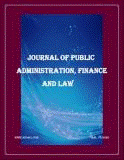REGULATION OF ASSET DEPRIVATION CRIMINAL SANCTION IN TAX CRIMINAL ACTIONS
REGULATION OF ASSET DEPRIVATION CRIMINAL SANCTION IN TAX CRIMINAL ACTIONS
Author(s): Rudi Margono, I Nyoman Nurjaya, Tunggul Anshari Setia Negara, Heru R. HadiSubject(s): Criminal Law, Politics and law, Fiscal Politics / Budgeting, Comparative Law
Published by: Editura Tehnopress
Keywords: Taxation; Regulation; Criminal Sanctions; Asset Deprivation;
Summary/Abstract: Law Number 16 of 2009 concerning General Provisions and Tax Procedures (UU KUP), regulates administrative sanctions and criminal sanctions. Criminal sanctions in the KUP Law are not in accordance with the philosophy of the purpose of the establishment of the Act, which is to raise funds from the public. In addition, the KUP Law method does not regulate how to save state revenue losses because it does not regulate the implementation of criminal fines, the legal implications of varying decisions that cause legal uncertainty, injustice and have not provided benefits, especially in an effort to collect taxes. The purpose of this paper is to find out, analyze and formulate how criminal sanctions should be confiscated assets seizure in tax crime. This research is a normative legal research with legislation approach, historical approach, comparative law approach, conceptual approach and case approach. The legal materials used are primary and secondary legal materials. Primary sources are basic norms and regulations, while secondary sources include new and up-to-date scientific knowledge which includes books, research reports, journals, magazines. Analysis of legal material is done with descriptive perspective. The results of his research explained that the regulation of asset confiscation sanctions in the KUP Law is very important as a basis for the principle of legality that must not be violated. First, criminal law must not apply retroactively. Secondly, criminal law must be written and may not be convicted based on customary law. Third, the formulation of criminal provisions must be clear. Fourth, criminal provisions must be interpreted in a strict manner and prohibited from analogy, so as to guarantee legal certainty, justice and usefulness for the sake of realizing prosperity as stated in the Preamble of 1945 Constitution paragraph IV.
Journal: Journal of Public Administration, Finance and Law
- Issue Year: 2020
- Issue No: 17
- Page Range: 411-422
- Page Count: 12
- Language: English

